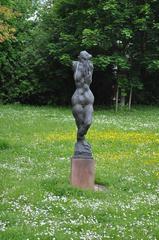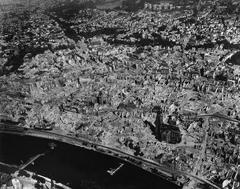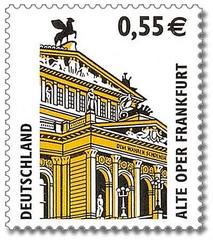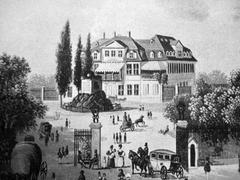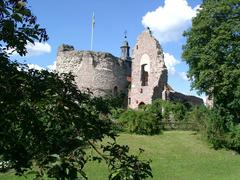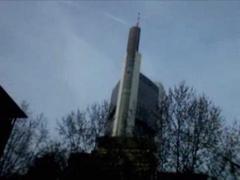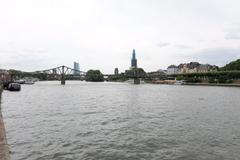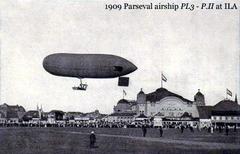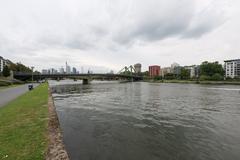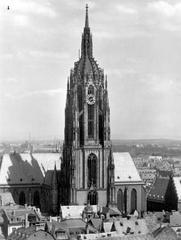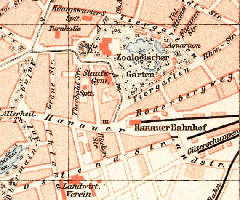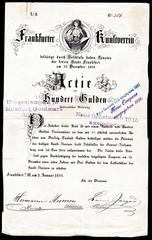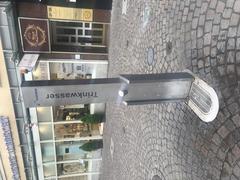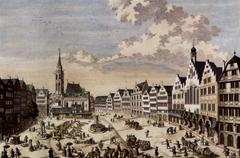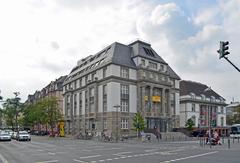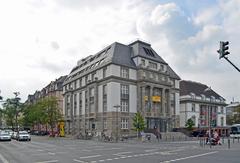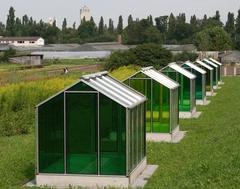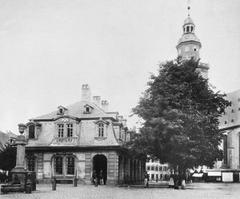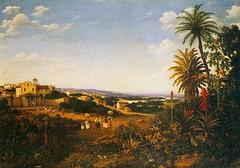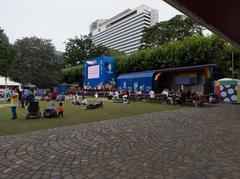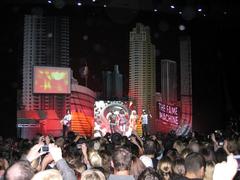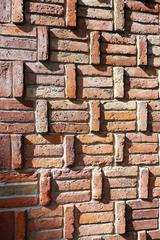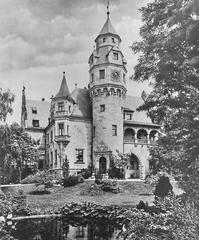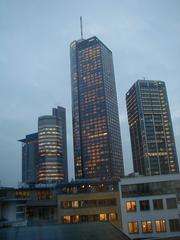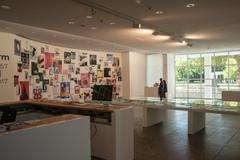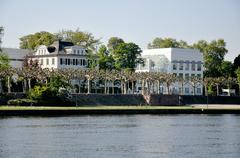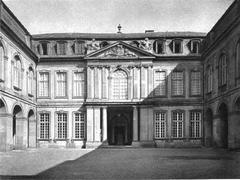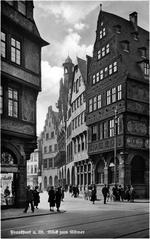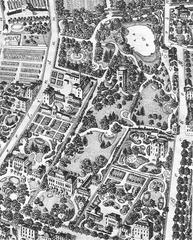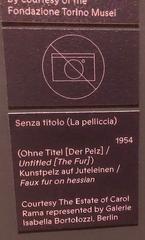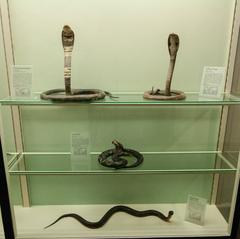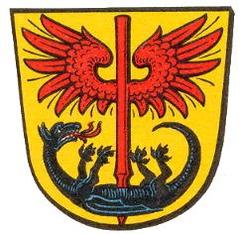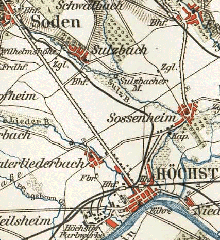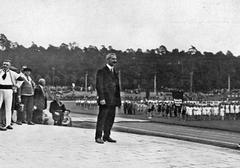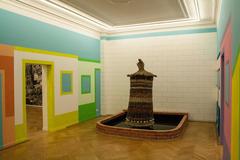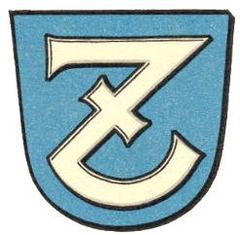University Library Johann Christian Senckenberg: Comprehensive Visitor Guide, History, and Cultural Highlights
Date: 14/06/2025
Introduction
The University Library Johann Christian Senckenberg (UB JCS) is not only the central academic library for Goethe University Frankfurt, but also a beacon of cultural heritage in the city. Tracing its origins to a town library founded in 1484 and shaped by the legacy of physician-philanthropist Johann Christian Senckenberg, UB JCS today is one of Germany’s largest scholarly libraries. It houses rare treasures such as the Gutenberg Bible, Germany’s largest Judaica and Hebraica collections, and extensive holdings in the natural sciences. The library’s architectural blend of postwar modernism and classical elements, its commitment to provenance research, and its pioneering digital initiatives make it a must-visit for scholars, tourists, and anyone interested in Frankfurt’s intellectual landscape (Wikipedia; Senckenberg Institute; UB Frankfurt).
This guide provides everything you need to plan your visit—including history, collections, visiting hours, access policies, architectural features, travel tips, and recommendations for nearby attractions.
Table of Contents
- History and Foundations
- Collections and Special Exhibitions
- Architecture and Atmosphere
- Visiting Information: Hours, Tickets, Accessibility
- Digital Resources and Online Access
- Guided Tours and Educational Programs
- Practical Travel Tips and Local Attractions
- Frequently Asked Questions (FAQ)
- Provenance Research and Restitution
- Contact and Useful Links
- Summary and Visitor Recommendations
- Sources
History and Foundations
Early Origins
UB JCS’s roots stretch back to the establishment of Frankfurt’s town library in 1484, which laid the foundation for centuries of intellectual growth. In 1763, Johann Christian Senckenberg founded the Senckenberg Library, prioritizing scientific advancement and public welfare. His vision, realized through the Dr. Senckenberg Foundation, became integral to Frankfurt’s academic and cultural scene (Senckenberg Institute).
Major Mergers and 20th-Century Transformation
By 1824, the Senckenberg Library merged with the Stiftsbibliothek, consolidating and strengthening its scientific focus. The founding of Goethe University Frankfurt in 1914 prompted further collaboration among Frankfurt’s libraries, leading to the post-WWII formation of the Stadt- und Universitätsbibliothek Frankfurt am Main (StUB). In 2005, the StUB and Senckenbergische Bibliothek united to form the present-day University Library Johann Christian Senckenberg, now under the patronage of the State of Hesse (Kultur Frankfurt).
Collections and Special Exhibitions
Rare and Notable Holdings
- Gutenberg Bible: Acquired in 1802, this complete edition is a jewel of European printing (Wikipedia).
- Judaica and Hebraica: The largest collection in Germany, vital for Jewish studies and historical research.
- Natural Sciences: Rich holdings in botany, zoology, geology, and entomology, reflecting Senckenberg’s legacy and the library’s role as a Special Subject Collection Library (University Library Frankfurt – Biology Collection).
Special Exhibitions
- Library of Lost Books: An acclaimed exhibition (Nov 2024–Jan 2025) tracing the fate of Jewish scholarly works plundered during the Nazi era. This international project, in partnership with the Leo Baeck Institutes and Goethe University, has received the Grimme Online Award (Library of Lost Books Exhibition; libraryoflostbooks.com).
Digital and Biodiversity Resources
- Specialised Information Service for Biodiversity Research: Funded by the DFG, this initiative enhances digital access to literature in systematics, ecology, and evolutionary biology (Biology Collection Profile).
Architecture and Atmosphere
The main library building, designed by Ferdinand Kramer and completed in 1964, exemplifies postwar modernism. Its functional, light-filled interiors support both quiet study and collaborative work. Key features include:
- Prometheus Statue: A striking bronze figure by Ossip Zadkine greets visitors at the entrance (Wikipedia).
- Grand Reading Halls: Spacious, minimalist, and flooded with natural light.
- Digital Infrastructure: Modern computer labs, multimedia workstations, and building-wide Wi-Fi.
- Accessibility: Wide corridors, ramps, elevators, and bilingual signage ensure inclusivity for all visitors (library.macromedia.de).
Visiting Information: Hours, Tickets, Accessibility
Location
- Address: Freimannplatz 1, 60325 Frankfurt am Main, Westend Campus
- Transport: Easily reached by tram, bus, or U-Bahn (“Westend” station, U6/U7). Parking is limited; public transport is recommended (campus map).
Opening Hours
- Central Library:
- Monday–Friday: 8:00 AM – 11:00 PM
- Saturday: 10:00 AM – 8:00 PM
- Closed Sundays and public holidays
- Check library news for holiday and special section closures.
Admission and Registration
- Free Entry: No tickets required; open to all.
- Registration: Required only for borrowing; temporary library cards available for visitors.
Accessibility
- Fully wheelchair accessible
- Elevators, ramps, and accessible restrooms
- Assistance available on request (contact)
Digital Resources and Online Access
UB JCS offers a comprehensive online catalogue (OPAC) covering books, journals, theses, DVDs, and digital editions. As part of the Hessisches BibliotheksInformationssystem (hebis), it supports regional and interlibrary loans (Frankfurt.de). Digital resources and podcasts are available onsite and online (podcast page).
Guided Tours and Educational Programs
- Guided Tours: Offered for groups and special exhibitions. Advance booking recommended via the official website.
- Workshops: Research skills, academic writing, and curator-led exhibition tours.
Practical Travel Tips and Local Attractions
-
Nearby Sights:
- Goethe House
- Römerberg (historic town square)
- Frankfurt Cathedral
- Senckenberg Natural History Museum
- Goethe University Botanical Gardens
-
Photography: Allowed in public areas; ask about restrictions for special exhibitions or rare collections.
-
Onsite Amenities: Lockers, vending machines, and nearby cafés.
Frequently Asked Questions (FAQ)
Q: What are the University Library Johann Christian Senckenberg visiting hours?
A: Monday–Friday, 8:00 AM–11:00 PM; Saturday, 10:00 AM–8:00 PM; closed Sundays/holidays. Check the website for seasonal changes.
Q: Is there an entry fee or tickets required?
A: No, entry is free; registration needed only for borrowing.
Q: Are guided tours available?
A: Yes, book in advance via the library’s website.
Q: Is the library accessible for people with disabilities?
A: Yes, with comprehensive facilities and assistance upon request.
Q: Can I take photographs inside?
A: Non-flash photography permitted in public areas; restrictions apply to special collections.
Provenance Research and Restitution
UB JCS is at the forefront of provenance research, especially regarding items acquired during the Nazi era. Its active participation in restitution projects reflects its dedication to ethical stewardship and the preservation of cultural memory (press release; Library of Lost Books Exhibition).
Contact and Useful Links
- Phone: +49 69 798-39205
- Email: [email protected]
- Library Homepage
- Goethe University Frankfurt
- Library Events and News
- Campus Map and Directions (PDF)
Summary and Visitor Recommendations
The University Library Johann Christian Senckenberg exemplifies the interplay between historical tradition, scholarly innovation, and cultural stewardship. With over 11 million media units, a celebrated architectural environment, and a dynamic schedule of exhibitions and events, UB JCS is an essential destination for anyone seeking to experience Frankfurt’s academic and cultural life. Before visiting, consult the official website for current hours and events, and consider enhancing your trip with the Audiala app for curated guides and audio tours.
Sources
- University Library Johann Christian Senckenberg: History, Visiting Information, and Highlights in Frankfurt, 2025, Senckenberg Institute (https://www.senckenberg.de/en/institutes/senckenberg-research-institute-natural-history-museum-frankfurt/libraries-frankfurt/)
- Exploring the University Library Johann Christian Senckenberg in Frankfurt: History, Collections, and Visitor Information, 2025, UB Frankfurt (https://www.ub.uni-frankfurt.de/biologie/sammlung_profil_en.html)
- Wikipedia contributors. (2024). Frankfurt University Library. Wikipedia. (https://en.wikipedia.org/wiki/Frankfurt_University_Library)
- Exploring the University Library Johann Christian Senckenberg: Architecture, Atmosphere & Visitor Guide in Frankfurt, 2025, library.macromedia.de (https://library.macromedia.de/en/locations/frankfurt/)
- Visitor Information and Practical Tips, 2025, UB Frankfurt (https://www.ub.uni-frankfurt.de/ueber/home.html)
- Library of Lost Books Exhibition, 2024, Goethe University Frankfurt (https://aktuelles.uni-frankfurt.de/english/library-of-lost-books-exhibition-in-frankfurt-tracks-down-plundered-jewish-works/)
- Kultur Frankfurt: University Library Johann Christian Senckenberg, 2025 (https://kultur-frankfurt.de/portal/en/Science/ScientificLibraries/189/1479/0/0/1443.aspx)
